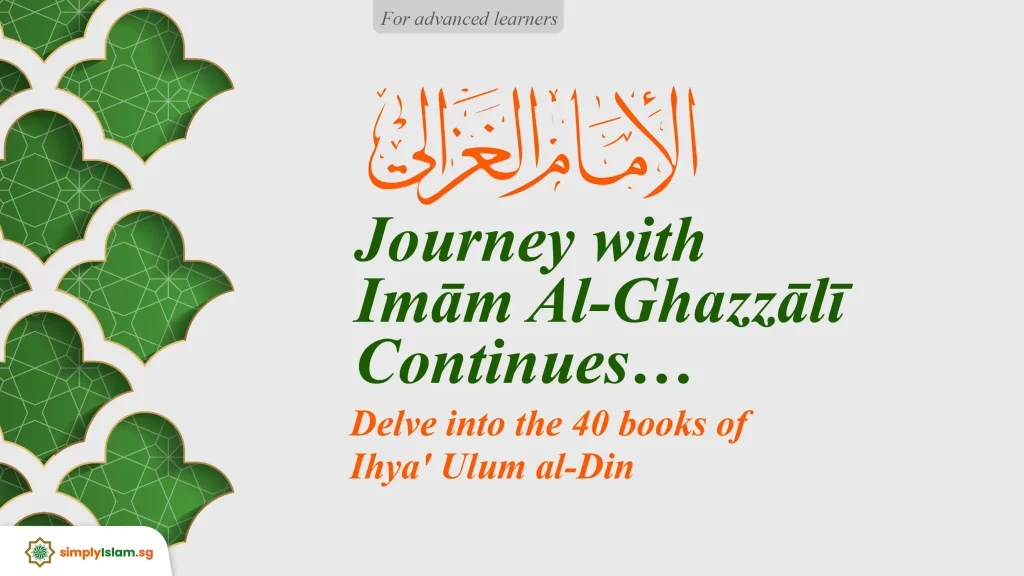Journey with Imam Al-Ghazzali Continues..
Coming Soon
What You Will Learn In This Course
- Students will delve into the book of asrar al-tahara (The Mysteries of Purification).
- Students will delve into the book of asrar al-salat (The Mysteries of Prayer).
- Students will delve into the book of asrar al-zakat (The Mysteries of Charity).
- Students will delve into the book of asrar al-siyyam (The Mysteries of Fasting).
About This Course
Alhamdulillah we are embarking on yet another spiritually invigorating journey, to explore the profound teachings of one of Islam’s greatest scholars, Imam Abu Hamid al-Ghazali, through his timeless work Ihya’ ‘Ulum al-Din (The Revival of the Religious Sciences).
This course will guide you through the spiritual and practical dimensions of essential Islamic practices, helping you gain a deeper understanding of your faith through the in-depth study of Imam Al-Ghazzali’s Ihya’ Ulum al-Din.
Books Covered in this Course:
Book 3: The Mysteries of Purification (Asrar al-tahara): Delve into the essential practice of purification, which prepares us for daily prayers. Imam Ghazali’s insights into wudu, ghusl, and tayammum will help you understand not just the outward actions, but the deeper spiritual significance of these rituals in cultivating purity of the heart.
Book 4: The Mysteries of Prayer (Asrar al-salat): Prayer (Salah) is at the core of a Muslim’s connection with Allah. In this section, you will discover the profound meaning of the prayer itself—both outwardly in the prescribed actions, and inwardly in cultivating humility, sincerity, and focus of the heart. Imam Ghazali’s teachings offer practical solutions to address distractions and help you engage more fully in your worship.
Book 5 & 6: The Mysteries of Charity & Fasting (Asrar al-zakat & asrar al-siyyam): Charity (Zakat) and fasting (Sawm) are fundamental pillars of Islam. Imam Ghazali explores not only the outward obligations and etiquette related to these practices, but also their inner dimensions. Understand how charity purifies the soul and fosters a spirit of generosity, and how fasting serves as a means of self-discipline, humility, and spiritual growth.
This course provides both practical advice and spiritual wisdom, offering a comprehensive understanding of these crucial aspects of worship. Whether you’re seeking to improve the sincerity of your daily rituals or looking to deepen your connection to Allah, these books will guide you on your journey.
Course Details
- Commencement Date: 08 January 2025
- Venue: Online via Zoom
- Frequency: Every Wednesday
- Instructor: Dr Muhammad Mubarak Habib Mohamed
- Medium of Instruction: English
- Course Fees: $700.00 – $750.00 (non-refundable)
- Time: 8.00 - 9.30pm
Entry requirements:
- This course is open to all, ages 18 and above. No knowledge, exposure or familiarity to Islamic knowledge is required. However, students are encouraged to explore the first part of the course 'Journey with Imam Al-Ghazzali Continues...' covering Book 1 and Book 2 to follow through the rest of the books in his work, Ihya Ulum Al-Din.

-
Dr Muhammad Mubarak obtained his Doctor of Philosophy Degree in Islamic Civilisation and Contemporary Issues from University of Brunei Darussalam under the supervision of Emeritus Professor Datuk Dr Osman Bakar. He holds a Master of Art degree in Islamic Spiritual Culture and Contemporary Society from the International Institute of Islamic Thought and Civilisation (ISTAC). He also has a Master of Education degree specialising in curriculum and teaching from the National Institute of Education (NIE) Singapore. Dr Mubarak holds a postgraduate diploma in Islamic Psychology from Cambridge Muslim College, a postgraduate diploma in Education and In-service Diploma in Physics from NIE. Dr Mubarak research and interest cover the area of classical Islamic Intellectual Thoughts with the eye towards solving contemporary issues facing humanity. He seeks to use the principle of tawḥīd as the integrating tool in synthesising the universal aspects of the Islamic Intellectual Traditions with contemporary knowledge with the goal of providing a comprehensive and holistic solutions to some of the crisis facing contemporary humanity. He has been a member of the Religious Rehabilitation group since 2009. He actively mentors and tutors detainees and prepares them for re-integration into the society upon their release. He is also a volunteer with Family and Inmates ThRoughcare Assistance Haven (FITRAH) and conduct religious counselling with the Singapore Prison Services. He is a physics and mathematics educator in a secondary school in Singapore.
Course Content
In The Mysteries of Purification (Kitab asrar al tahara), the third of the forty books of the Revival of the Religious Sciences (Ihya’ ‘ulum al-din), Abu Hamid al-Ghazali explains the fundamentals of the purification that is necessary in order to perform the five daily prayers. Over the following chapters, al-Ghazali examines the lesser ablution (wudu), the greater ablution (ghusl), and the “dry ablution” (ablution without water, or tayammum). He discusses the etiquette of the bathhouse and outlines exactly how to clean the body of external things and natural growths; finally, he discusses the beard and practices related to it.
In The Mysteries of the Prayer and Its Important Elements, book four of the 40 books of the Revival of the Religious Sciences, Abū Hāmid al-Ghazālī explains the inner and outer meanings of the prayer, a central practice for Muslims. He explains the acts involved in the outward elements of the prayer and outlines which of these acts are obligatory and which are sunna. He then discusses the inward requisites of the prayer—the practices of the heart— and presents practical remedies for a distracted heart. He also discusses the annual prayers and the prayers and supplications related to events such as eclipses, the prayer for rain, guidance, and need. This readable yet comprehensive work covers an array of issues from the essential outward aspects of how to pray, to the inward aspects of the state of the heart during the prayer and how to humble oneself completely. As a practical, yet profound book, it is essential reading for Muslims who seek a deeper comprehension of prayer, and for all those interested in understanding the meaning and place of prayer in Islam.
In the Mysteries of Charity and Its Important Elements (Kitab asrar al zakat wa-muhimatiha; book 5), and the Mysteries of Fasting and Its Important Elements (Kitab asrar al-iyyam wa-muhimatiha; book 6), of the forty books of the Revival of the Religious Sciences (Iya ulum al-din).
Abu Hamid al-Ghazali explains the inner and outer meanings of charity and fasting, two pillars of worship for Muslims. These are two of the five books that deal with the inner dimensions of Islamic worship; books 3, 4, and 7 address purification, prayer, and pilgrimage, respectively.
In book 5 al-Ghazali begins with a discussion of the various kinds of zakat and the conditions under which they become obligatory. He explains the manners related to zakat and its inward and outward conditions. He then discusses the recipients of zakat, who qualifies for it and in what circumstances, and the manners related to receiving it. Finally, al-Ghazali explains charity and its virtues.
In book 6 al-Ghazali begins with the outward obligations and sunna elements of fasting, and what is required if the fast is broken. He explains the mysteries of fasting and its inner conditions. Finally, he discusses the voluntary fasts and their order in supererogatory worship.
This readable yet comprehensive work covers an array of issues from the essential outward aspects of paying charity, to the inward aspects of the state of the heart during the fast and how to humble oneself completely. As a practical, yet profound book, it is an indispensable guide for Muslims who seek a deeper comprehension of these two fundamental practices for Muslims, and for all those interested in understanding the meaning and role of charity and fasting in Islam.
In the Mysteries of Charity and Its Important Elements (Kitab asrar al zakat wa-muhimatiha; book 5), and the Mysteries of Fasting and Its Important Elements (Kitab asrar al-iyyam wa-muhimatiha; book 6), of the forty books of the Revival of the Religious Sciences (Iya ulum al-din).
Abu Hamid al-Ghazali explains the inner and outer meanings of charity and fasting, two pillars of worship for Muslims. These are two of the five books that deal with the inner dimensions of Islamic worship; books 3, 4, and 7 address purification, prayer, and pilgrimage, respectively.
In book 5 al-Ghazali begins with a discussion of the various kinds of zakat and the conditions under which they become obligatory. He explains the manners related to zakat and its inward and outward conditions. He then discusses the recipients of zakat, who qualifies for it and in what circumstances, and the manners related to receiving it. Finally, al-Ghazali explains charity and its virtues.
In book 6 al-Ghazali begins with the outward obligations and sunna elements of fasting, and what is required if the fast is broken. He explains the mysteries of fasting and its inner conditions. Finally, he discusses the voluntary fasts and their order in supererogatory worship.
This readable yet comprehensive work covers an array of issues from the essential outward aspects of paying charity, to the inward aspects of the state of the heart during the fast and how to humble oneself completely. As a practical, yet profound book, it is an indispensable guide for Muslims who seek a deeper comprehension of these two fundamental practices for Muslims, and for all those interested in understanding the meaning and role of charity and fasting in Islam.

- Instructor: Dr Muhammad Mubarak Habib Mohamed
- Category: Biography
- Time: 8.00 - 9.30pm
- Total Lessons: 30 lessons
- Schedule: Every Wednesday
